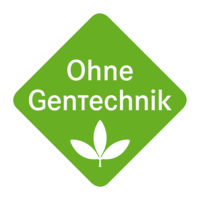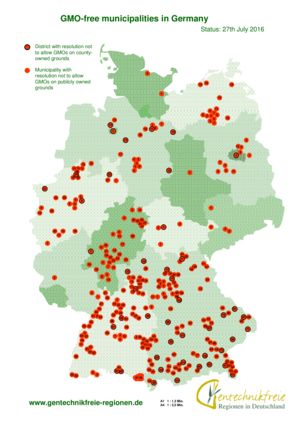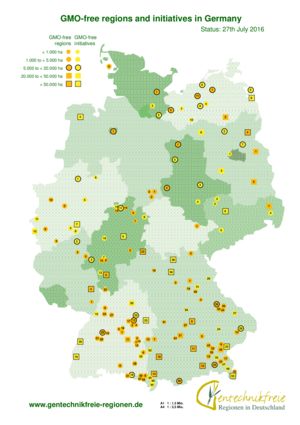Germany
Current activities
GUTE LANDWIRTSCHAFT BRAUCHT KEINE GENTECHNIK!
Naturland
Schreiben Sie den Abgeordneten des Europäischen Parlaments: Deregulierung der neuen Gentechnik stoppen!
IG Saatgut
NEIN ZUR DEREGULIERUNG DER NEUEN GENTECHNIKEN
Demeter e.V.
NATÜRLICH GEHT'S OHNE! KEINE AGRO-GENTECHNIK DURCH DIE HINTERTÜR
Bioland
Ein persönlicher Brief an Ihre Abgeordneten Es ist 5 vor 12 – wir bitten Sie um mehr als einen Klick
Save Our Seeds
Keine Gentechnik! NEUE GENTECHNIK IST UNTAUGLICH FÜR BEWÄLTIGUNG LANDWIRTSCHAFTLICHER KRISEN
Biokreis
Schreiben Sie den Abgeordneten des EU-Parlaments: Gentechnik nur mit Kennzeichnung & Risikoprüfung!
Aurelia Stiftung
Laufende Petition in Deutschland
Kennzeichnung und Regulierung aller Gentechnik-Pflanzen erhalten!
Nachricht
Zum Gentechnik-Gesetzesentwurf: Keine Einigung der EU-Regierungen – nur knappe Abstimmung im EU-Parlament
Widerstand lohnt sich – Deregulierung neuer Gentechnik-Pflanzen verhindern
2024-02-08 AbL
Organisations and institutions active on GMO
Verbändepapier: unterzeichnet von 139 Verbänden
Projekt Gentechnikfreie Regionen in Deutschland (German, English)
Arbeitsgemeinschaft bäuerliche Landwirtschaft e.V. - AbL (German)
Bioland - Verband für organisch-biologischen Landbau e.V. (German)
Bündnis zum Schutz der Bienen vor Agrogentechnik (German)
Bund Ökologische Lebensmittelwirtschaft - BÖLW (German)
BUND, Friends of the Earth Germany (German, English)
Bundesverband Naturkost Naturwaren (BNN) (German, English)
Bündnis Gentechnikfreie Landwirtschaft Berlin-Brandenburg (German)
Gen-ethisches Netzwerk (German)
Greenpeace Germany (German)
IG Saatgut (Initiative for GE-free Seeds and Breeding) (German, English)
Informationsdienst Gentechnik (German)
Mellifera e.V. (German)
Save Our Seeds (German and English)
Testbiotech e.V. – Institute for Independent Impact Assessment in Biotechnology (German and English)
Umweltinstitut München e.V. (German and English)
Verband Lebensmittel Ohne Gentechnik – VLOG (German, English)
GMO-free Labeling

Based on German legislation, „EG-Gentechnik-Durchführungsgesetz" (EGGenTDurchfG), food manufacturers and –retailers can label their products GMO-free since May 2008. The GMO-free label ("Ohne GenTechnik") is for food products manufactured accordingly. Primary it is used on animal products like meat, eggs and dairy products derived from animals fed without GM plants. Licensee partners and advocates for a food production without GMOs are organized in the Association Food without Genetic Engineering (VLOG). The VLOG represents over 650 food and feed manufacturers and retailers as well as sectors upstream and downstream to food production.
The development of the „Ohne Gentechnik" market shares for animal food in Germany is very positive: As many as 50 percent of the German milk, 60 percent of the poultry meat and 70 percent of eggs are produced „Ohne Gentechnik". Currently over 8.000 products are labeled with the "Ohne GenTechnik" seal that stand for combined annual sales of about 8 billion euros in 2018. The "Ohne Gentechnik" products for the German market are produced and certified mostly in Germany, but also in about 15 other European countries.
(Updated in September 2018 information provided by Verband Lebensmittel ohne Gentechnik e.V. (VLOG))
Official and institutional links
Bundesamt für Naturschutz - BfN (German)
Federal Institute for Risk Assessment - BfR (German, English)
Federal Ministry of Education and Research - BMBF (German, English)
Federal Ministry of Food and Agriculture - BMEL (German, English)
Federal Ministry for the Environment, Nature Conservation, Building and Nuclear Safety - BMUB (German, English)
Federal Office of Consumer Protection and Food Safety - BVL (German, English)
Public GMO Register of the BVL (German)
Federal Research Centre for Cultivated Plants – Julius Kühn-Institut
Updates + Overviews
Year 2016
347 GMO-free-municipalities (two more than in the year 2015) were declared in Germany by the end of July 2016.
The number of GMO-free-regions and GMO-free-farmers remained constant.
215 GMO-free-regions, 31,960 GMO-free-farmers, 1,182,728 ha/ 2,922,585 acres.
All Definitions, lists and maps can be accessed at the English section of the website GMO-free regions in Germany.
Download:
GMO-free Regions and Initiatives in Germany, as of 27th July 2016
GMO-free Communities in Germany, as of 27th July 2016
(Updated in September 2016 information provided by Bund für Umwelt und Naturschutz Deutschland e.V. (BUND) Friends of the Earth Germany)
***********************************
Year 2015
GMO-free regional governments:
11 out of 16 German federal states (among them 3 city states) signed the Charta of Florence and thereby joined the European GMO-Free regions network.
- 17th June 2010: accession of Thuringia
- 10th October 2011: accession of North-Rhine Westphalia
- 31st July 2012: accession of Schleswig-Holstein
- 11th October 2012: accession of Baden-Württemberg
- 22nd May 2013: accession of Saarland and Rhineland-Palatinate
- 29th January 2014: accession of Lower Saxony
- 10th April 2014: accession of Bavaria
- 21st May 2014: accession of Hesse
- 5th May 2015: accession of Bremen
- 7th May 2015: accession of Hamburg
By the beginning of August 2015, 215 GMO-free-regions, 345 GMO-free-municipalities and 31.960 GMO-free-farmers, i.e. 1.182.728 ha (2.922.585 acres), were declared in Germany. Definitions, lists and maps can be accessed at the English section of the website GMO-free regions in Germany.
There was no commercial cultivation of GMOs in Germany since 2012 and no deliberate releases since 2013. Lastly, GM potatoes (0.3 ha) and GM sugar beets (0.5 ha) were planted for experimental purposes in 2012.
The commercial cultivation of the GM corn MON 810 has been banned on April 14th 2009. BASF’s genetically modified starch potato “Amflora”, approved on 2nd of March 2010, had its approval withdrawn December 2013 by the EU General Court due to procedural error during the approval procedure. Until then it was grown on 15 ha in 2010 and ultimately on 2 ha in 2011.
(Updated in December 2015 information provided by Bund für Umwelt und Naturschutz Deutschland e.V. (BUND) Friends of the Earth Germany)
Legal documents
In German:
Gentechnikgesetz
Neues Gentechnikgesetz vom 4. April 2008, Dossier, Konsolidierte Fassung und Dokumente von Informationsdienst Gentechnik
Abstandsregelungen beim Anbau gentechnisch veränderter Pflanzen (GVP) in der Nähe von Schutzgebieten
Informationsdienst Gentechnik's Rechtsbibliothek
The GMO-fee labelling legislation „EG-Gentechnik-Durchführungsgesetz" (EGGenTDurchfG)
- German
- English


